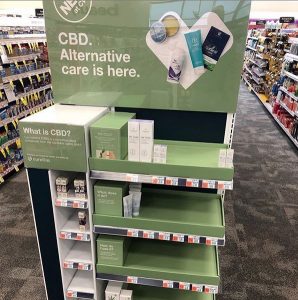In March on this site, I wrote:
CVS announced last week that, at more than 800 stores in eight states, it is now selling creams, sprays, and lotions infused with CBD, the nonintoxicating hemp component cannabidiol.
This, along with the sale of similar products at many other outlets, seems to give CBD the imprimatur of a great leap forward in health. Only one problem: there is minimal-to-no scientific evidence that CBD, in any form, helps anyone. All claims to pain relief from CBD are purely anecdotal. That doesn’t mean it’s harmful — scientists say there doesn’t appear to be a downside to rubbing it on your skin — but if you think you’re getting any analgesic effect from it, you’re not. And despite coming from the same plant as marijuana, applying it to the outside of your body won’t get you high, either.
None of that has stopped CVS from stocking CBD products. In a press release last week, the company said it was motivated by market forces and is responding to customer demand. There are lots of people in this country who would like to be able to buy heroin or meth at their local pharmacy, but I don’t see CVS giving in to those requests.
Now comes word from the FDA, after investigating, has come to the conclusion that, “CBD has the potential to harm you, and harm can happen even before you become aware of it.” As MarketWatch reported:
The FDA said that based on a lack of scientific information, the regulator cannot conclude that CBD is “generally recognized as safe among qualified experts for use in human and animal food.” The announcement also disclosed that 15 companies around the U.S. had been warned that they were illegally selling products containing CBD.
The compound “can cause” liver injury, affect other drugs, and when combined with alcohol or other depressants can increase the risk of sedation or drowsiness. The FDA also detailed other potential side effects such as drowsiness, gastrointestinal distress and changes in mood.
Beyond the warnings, the FDA said that there were many aspects about CBD that remain unknown, such as the effects of taking CBD daily for extended periods.
Will this mean the closing of the thousands of shops that have opened across the US that sell and promote the use of CBD? That remains to be seen, but if the companies producing mass quantities of it are prevented from doing so by the federal government, I’ll bet we’ll see a lot of boarded-up storefronts in the next few months — and a lot of shelves at CVS, Walgreens, and other pharmacies quickly restocked with non-CBD products.

